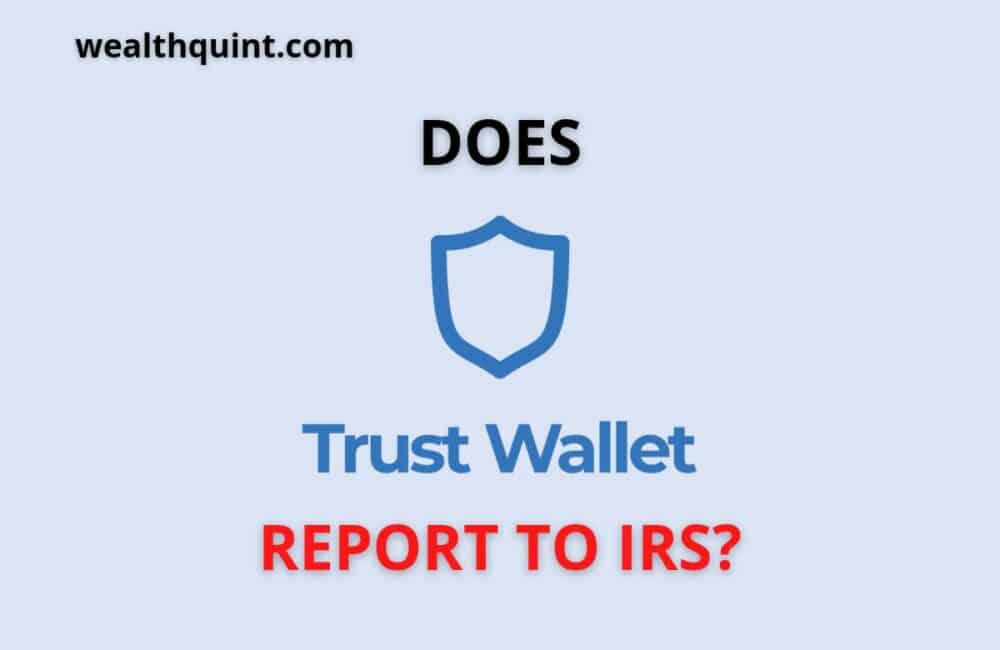Trust Wallet is one of the leading cryptocurrency wallets in the world with support for hundreds of crypto coins and is present in 160+ countries.
The best-selling feature of Trust Wallet is its intuitivity which makes it easier for a newbie to buy and keep cryptocurrencies. Plus, Trust Wallet provides vital support interfaces to dApp and NFT platforms from where additional purchases/investments can be made.
Does Trust Wallet Report To IRS?
Trust Wallet may or may not report to the IRS because Trust Wallet had not made it explicit if it directly reports to the IRS like Coinbase, Kraken, etc. which actually do. But from a compliance point of view, they have to report at least indirectly.
Since many governments across the world have exerted further pressure on cryptocurrency, the IRS forces cryptocurrency exchanges and wallets to share consumer data to ensure that they are tax compliant and also to ensure security.
But note that, neither on the Trust Wallet website nor on the privacy policy page have they explicitly mentioned that they share your information with the tax authorities. But of course, they have to if they have to successfully continue operations in the country.
So, if you have assets on Trust Wallet and have received them again by selling, disposing of them, it is safer to just file them on your report.
How To File Taxes With Trust Wallet?
Not very difficult, in short, you just need to know your cryptocurrency transaction history in that financial year, calculate how much you have gained, and then file taxes on that. Here’s how to find the history of transactions on the app.
Step 1: Open the Trust Wallet App
Step 2: Under the token section, click any cryptocurrency
Step 3: View the history of transactions of that cryptocurrency
Step 4: You can click on a specific transaction if you want to know more about it.
Step 5: Export your wallet history to CSV.
Following this, you can either calculate the gains or losses manually or make use of specific services available online that automatically generate your crypto tax reports.
To do the latter, you can link your Trust Wallet on CoinPanda, or Koinly. To do that, you need to just import the CSV files on these platforms and they will convert the cryptocurrency values to fiat currency values, identify which are taxable and which are not, and generate a clean report with an overall taxable amount you have to pay.
Does Trust Wallet Give Tax Documents?
No, the Trust Wallet platform does not give any tax report, form, or any such document. You can just download the transaction history and calculate taxes yourself to file it.
But with the growing pressure on these exchanges and cryptocurrency services to be tax compliant, expect in the future for Trust Wallet to make it easier to file taxes through their own auto-generated report for you.
How Does Cryptocurrency Taxes Work?
Do remember that cryptocurrency is still in the nascent stage and the IRS is working hard to enforce consistent and acceptable cryptocurrency tax guidelines. According to the government rules, you are supposed to pay taxes on crypto. They consider cryptocurrency as an asset (or property) and accordingly, similar rules apply.
When you dispose of, sell or trade cryptocurrency, you would need to pay tax on the gain. For instance, you have got a cryptocurrency at $10000 and you sell it at $15000, you need to pay tax on the $5000 gain.
On the other hand, if you do report a loss when you dispose of cryptocurrency, you can have that deducted from your losses.
Also, note that buying cryptocurrency is not a taxable event. Even if the value of the coin increases, you can buy and hold them without paying any taxes.
The IRS has been actively participating in this space so that investors pay their crypto taxes effectively. On form 1040, cryptocurrency owners must answer if they have had any virtual currency transactions during that year.
On the other hand, according to Forbes, cryptocurrency exchanges provide you with Form 1099-K if you had more than 200 transactions and have more than $20000 in training in that fiscal year.
Conclusion
In short, yes they do. And even you have to report to the IRS about your cryptocurrency gains.
Well, filing taxes can be painful but it is a necessity if you are a citizen of the country and not doing cryptocurrency can lead to serious legal offenses and punishments. File your taxes on time and enjoy growing with cryptocurrency.




